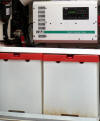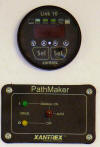|

Summary
Obviously a vehicle electrical system is 12 VDC. In this
vehicle there are two 12 volt systems; one for the traditional vehicle system,
the second for the grooming systems supported by batteries. for clarity,
the systems are referred to as the vehicle, or starting system and the service
or grooming system. Some manufacturer literature refers to the systems as
Starting and House batteries.
 |
Starting from the basics, the grooming batteries are contained in boxes, which
sit in this frame in the rear compartment.
|
 |
Batteries, 2 each, are held in these plastic enclosures.
There is a steel frame "behind" the batteries, from this viewpoint,
which is actually in front of them as the vehicle travels.
Notice the white bar over the battery cases, to hold them down.
We haven't crash tested this arrangement, but the batteries are
heavy, around 500 pounds, an they shouldn't be moving around. |
 |
Here is a top view of the connected batteries. Four six
volt units in series-parallel for greater 12 volt output. |
 |
Here are the monitor/control devices, mounted in the interior
control panel. The round one is a Xantrex Link-10, which gives
a wealth of information about battery load and charging. The
lower device is the Xantrex Pathmaker remote control. The
Pathmaker integrates the vehicle charging/battery system with the
service batteries. When the vehicle battery is charged and the
alternator has excess capacity, it charges the service batteries.
If the vehicle battery were to run down, the Pathmaker will connect
the service batteries to the vehicle system for a built-in "jump"
start. |
|



